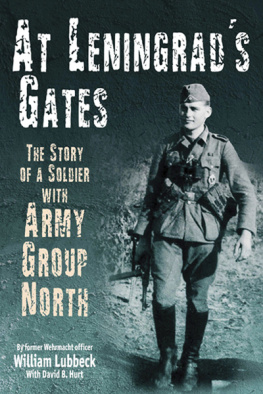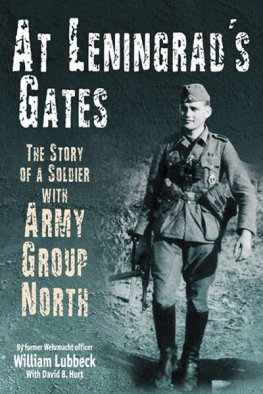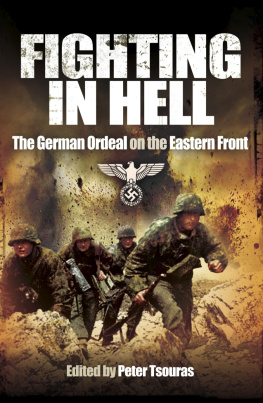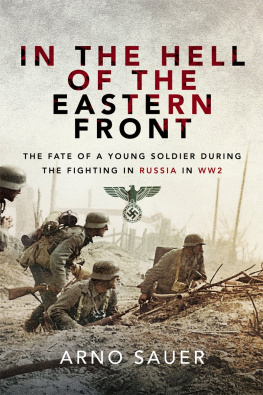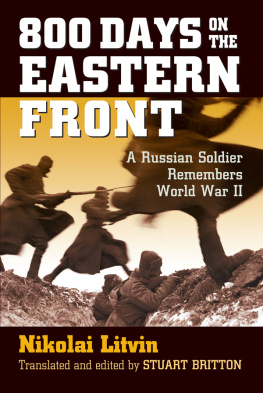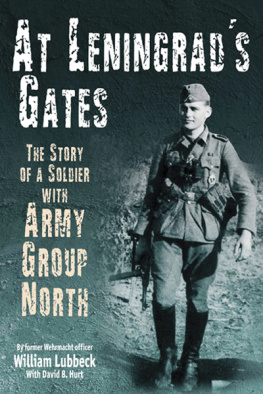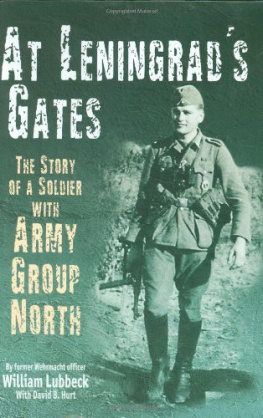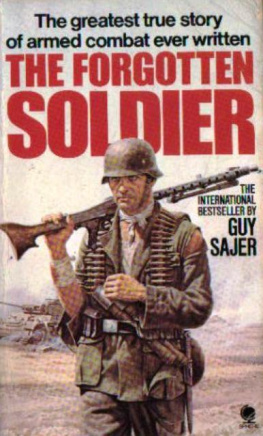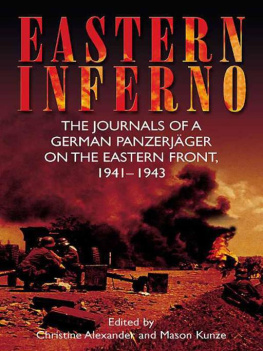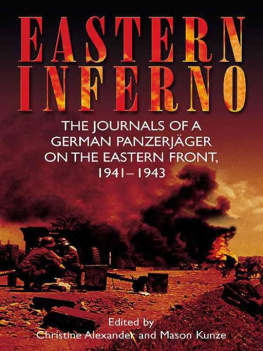IN TELLING MY STORY, I do not wish to impress anyone or present myself as a hero. Like millions of other troops on the frontline of the Second World War, I was just a soldier who obeyed orders and carried out my duties. The heroes were those comrades who never returned home and were often left unburied in far-off fields.
God had other plans for me and spared my life. This testament of my experience is a memorial to the service and sacrifice of those soldiers who did not come back.
This book is also dedicated to Anneliese, who served as a Red Cross nurse in German field hospitals attending wounded troops during the final two years of the war. On a more personal level, words cannot express my eternal gratitude for the hope that her love gave me during my long years in combat and for the many happy decades of marriage that we enjoyed after the war.
During a trip to Germany in the summer of 2003, my daughter discovered my wartime correspondence with Anneliese. Reading through these letters brought forth bittersweet emotions, but helped to give me a kind of closure. I also feel a sense of relief in being able to share my experiences of the war with my family and a broader audience.
It is my hope that this account will help to increase public understanding of the Second World War, especially of the brutal nature of the fighting on the Eastern Front. In particular, Americans often misunderstand the motivations of German troops who fought in World War II. Most of the common soldiers were not supporters of Hitler and the Nazi regime, but simply patriotic Germans who sought to serve their country.
I am deeply indebted to the people of the United States for accepting my family and me as their fellow citizens and for allowing us to realize the American dream. It is my hope that this story may help the citizens of my adopted country to gain a more complete appreciation of the diverse experience of American immigrants.
INTRODUCTION
READING THE FIRSTHAND account of a soldier who marched into Russia with Napoleons army in 1812 personalized that distant conflict for me in a way that a general history could not. By the end of that memoir, Jakob Walters The Diary of a Napoleonic Foot Soldier , I had become convinced that a more recent veteran of warfare in Russia, William Lubbeck, should narrate an account of his own remarkable experiences as a German soldier during the Second World War.
While from todays vantage point we often perceive the past as following an inevitable course to the present, Lubbeck lived through the unfolding history of that struggle, uncertain of his own fate or of the larger outcome. His modesty made it difficult to persuade him to share his exceptional story, but he ultimately concluded that the testimony of a surviving German soldier would serve to honor the memory of his fallen comrades. In addition, a memoir could help a modern audience to develop a wider perspective on an increasingly remote war.
The writing process involved countless hours of recorded interviews as well as even longer periods transcribing the tapes. Memories do not occur in chronological order, so as the story gradually revealed itself it was necessary to flesh out ever-more details and fill in the gaps. In this task, Lubbecks recently discovered wartime correspondence with his late wife Anneliese proved invaluable in helping him to recall events as well as recapture his personal feelings at different stages of the war. A divisional history written by Kurt von Zydowitz, Die Geschichte de 58.Infanterie Division 19391945 (Podzan, 1952), was also invaluable in reminding Lubbeck of the larger chronology.
After many years living in the United States, Lubbeck generally related measurements in non-metric terms. For consistency we have kept the American usage of yards, miles, Fahrenheit, et al., throughout, at times calculating them from metric. He also often utilized American syntax in other observations, employing terms like gung-ho and boot camp. With military ranks he made distinctions in German which are included here in parentheses.
Although Lubbeck has naturally acquired a greater overview on the war today than he had while serving in it, we made a conscious decision to confine this work to his personal experiences at the time rather than overviews, criticisms, or what ifs. His actions, observations, and emotions during those tumultuous years were our sole focus.
While he had never spoken in depth about the war since his arrival in North Americain fact, he was reluctant to do sothe wealth of information that poured out as our interviews progressed impressed me greatly. The decades faded away as he recalled his prior life as a citizen and soldier for Germany, leaving the vigorous younger man in the photographs only barely concealed behind the erudite, retired U.S. engineer.
In the period before and during the Second World War, the German peoples perception of events contrasted sharply with the American outlook. Allowing ourselves to see these events from a different point of view does not undermine the ultimate morality of the cause for which the United States and the Western Allies fought, but rather helps us better comprehend why educated, civilized Germans were prepared to fight and die under such a regime.
William Lubbecks account of these years explains how the Nazi regimes early success in reviving Germanys power and prestige helped it win a broader measure of public support. Yet, he also argues that many Germans nonetheless mistrusted the Nazis and recognized a darker side to Hitlers dictatorship. This contradiction raises the critical question of why many Germans were prepared to wage war, even if they often held deep and growing doubts about their government.
Nazi propaganda played an important role in shaping German public opinion, manipulating deeply held popular convictions about the world. In the end, most Germans accepted that war was necessary to overturn the perceived injustices inflicted on their nation by the Treaty of Versailles and to eliminate the threat to European civilization posed by Stalinist Communism.
While Lubbeck approved of the rebuilding of Germanys economic and military power and believed in the justice of his countrys cause, he opposed the Nazi regimes repressive character and radical extremism. Yet, despite his mistrust of Hitler and lack of faith in the Nazi ideology, he was nonetheless willing to persevere through six years of war. As with most German soldiers, his fight was inspired by a patriotic love for his country, a deep sense of commitment to duty, and a basic desire to bring himself and his comrades through the war.

